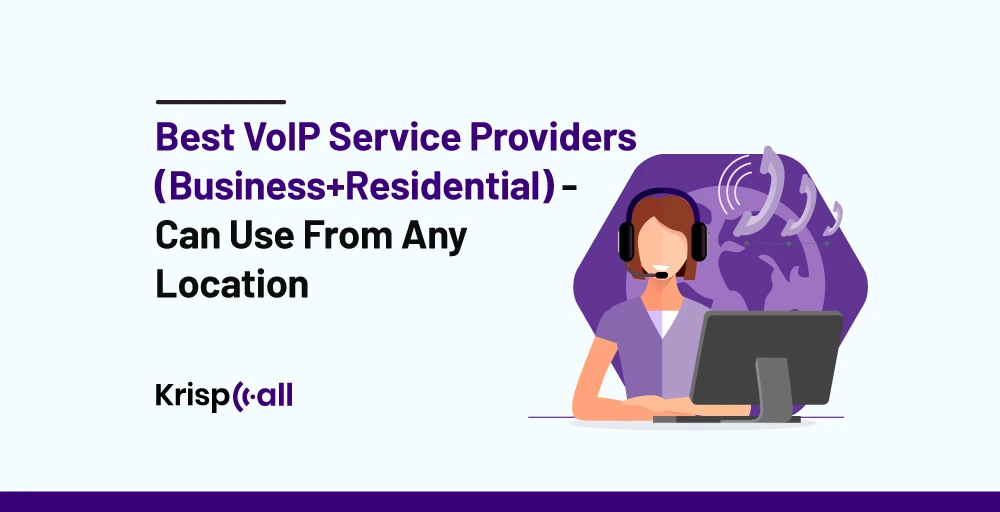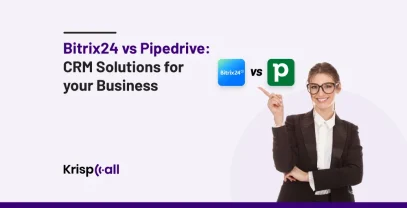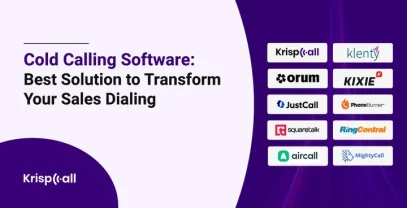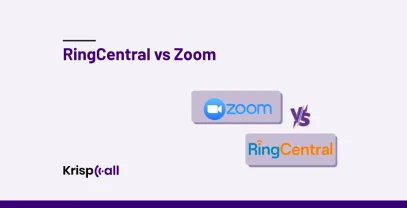Are you looking into VoIP service providers that will help you improve your business communication efforts in 2024? Or have you decided to switch to a VoIP solution in 2024 in order to improve your company’s communication capabilities?
Currently, the VoIP market is flooded with hundreds of providers, each with unique features and pricing. Choosing the right VoIP phone service for your business can be challenging, which will become even more difficult in the coming year, so we reviewed the best options available out there in the market and ranked them to assist you in your selection.
In this article, we’ll explore what VoIP service providers are, the types of VoIP providers, and, ultimately, the top VoIP service providers available for 2024. By using them, you can stay connected from any location as a small business owner, a large enterprise owner, or a homeowner.
Let’s begin!
What is a VoIP Service Provider?
A VSP, short for Voice over Internet Protocol service provider, is an enterprise that offers VoIP services to its customers, including both businesses and individuals.
With the help of VoIP service provider offerings, users can utilize internet-based communication methods, like making and receiving calls, sending text messages, and engaging in video calls, instead of relying on wired telephone networks.

What are the Types of VoIP Providers?
There are several different types of VoIP service providers, each with its own unique set of features & benefits and catering to various individual and business sizes and specific needs. Here are some of the most common types of VoIP providers-
1. Hosted VoIP Providers
These are the most common type of VoIP service provider, and they host all of the necessary VoIP equipment, including a PBC and required softwares, on their own servers and deliver the service to their clients over the internet.
2. Cloud-based VoIP Providers
They function similarly to hosted VoIP providers, but they take the concept of hosting to the next level, as they run their entire VoIP infrastructure on cloud-based servers, giving them several advantages over other types of VoIP providers.
3. Local VoIP Providers
Typically serving a specified geographical location, local VoIP providers offer services to their region-specific customers, allowing them to make and receive calls through a virtual local phone number.
4. Enterprise VoIP Providers
These providers are the ones that specialize in providing VoIP services to large businesses and organizations. They offer services that include a complete set of functionalities with advanced features and customizable solutions to meet the diverse communication needs of small companies and enterprises.
5. White-label VoIP Providers
These are like whole-seller organizations that allow other companies to resell their VoIP services under their own brand. Small companies looking to offer VoIP services to their customers without investing in VoIP infrastructure use this option.
6. UCaaS
UCaaS provides various communication and collaboration tools, including VoIP services, video conferencing software, and instant messaging apps, all integrated into a single platform through a cloud-based medium.
7. CPaaS
Communication Platform as a Service (CPaaS) provider offers APIs that allow developers of other applications or platforms to integrate VoIP functionality into their own applications or platforms and relay services.
Top 13 Best VoIP Service Providers (Business & Residential) in 2024
As of now, you know what providers are, which leads us to our next task: picking one. To help you with that, here is a list of top VoIP providers, sorted by customer reviews, services offered, price, and availability worldwide:
1. KrispCall
With a focus on affordability and functionality, catering to small businesses, enterprises, and call centers alike, KrispCall stands out at the top of this list. It is a renowned cloud-based VoIP service provider with near-perfect customer ratings on various review websites and is trusted by 4500+ companies in more than 100 countries.
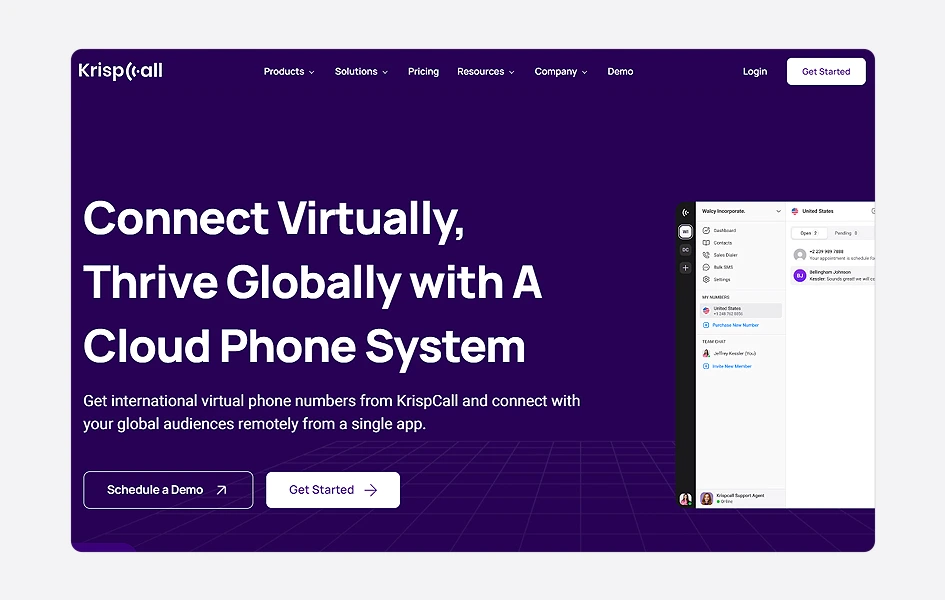
What sets it apart from the competition is its wide range of features like call transfer, number sharing, and global calling suitable for any kind of use, that too at an affordable plan and an easy-to-use interface. Through it, you can also get toll-free, local, mobile, and business virtual numbers that you can use to build an efficient and well-connected team.
With its finest support system and innovative features, it’s the best option to go for if you are looking for a voice-over-internet service.
Features:
- Unified Callbox
- Call Monitoring
- DND for Agents
- Shared Number
- Call Analytics
Pros:
- High-quality calls.
- An easy-to-use user interface.
- Modern features and innovative design.
Cons:
- Apps for Windows and Mac OS are not currently available.
- Its usage requires a stable Internet connection.
Cost:
- Essential: $15 monthly/user
- Standard: $40 monthly/user
- Enterprise: Designed by you
2. Zoom Phone
Being second on this list, Zoom Phone is another top pick for businesses of all sizes because it is simple to operate, affordable, scalable, and offers global coverage as well as local phone numbers in various regions.
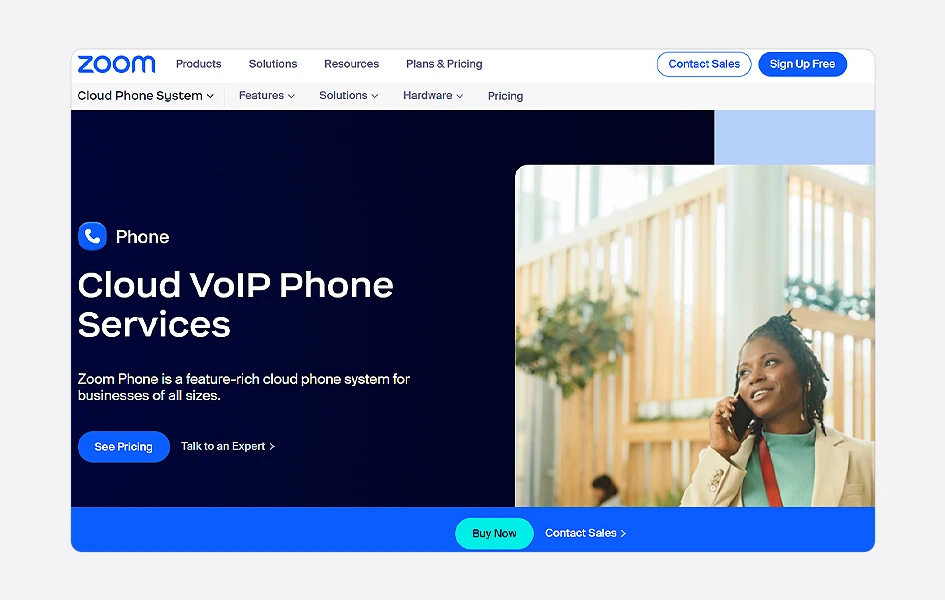
It offers a feature-rich virtual phone system loaded with various benefits that help businesses improve productivity, cut costs, and improve business outcomes by modernizing their communication systems. Hence, it is known as one of the leading service providers in the market.
Features:
- Global call routing
- Auto attendants
- Call queues
- Advanced analytics monitoring dashboards
- Central management tools
Pros:
- Easy to set up and quick to purchase.
- It is reliable and runs smoothly even with a slow connection.
- Ability to integrate with Zoom products.
Cons:
- Disjointed management.
- Only 40 minutes for video conferencing.
- Security isn’t as good as others on this list.
Cost:
- Pay as You Go (USA & Canada): $120 per year per user
- Unlimited Regional Calling (USA & Canada): $180 per year per user
- Pro Global Select: $240 per year per user
3. Vonage
Gartner Magic Quadrant reports in 2024 have praised Vonage’s affordability and robust set of functionalities, which are also mirrored in its high customer ratings. Trusted by companies like Domino’s, DHL, Glassdoor, and many more, Vonage has established itself as a reputable cloud-based VoIP service provider.
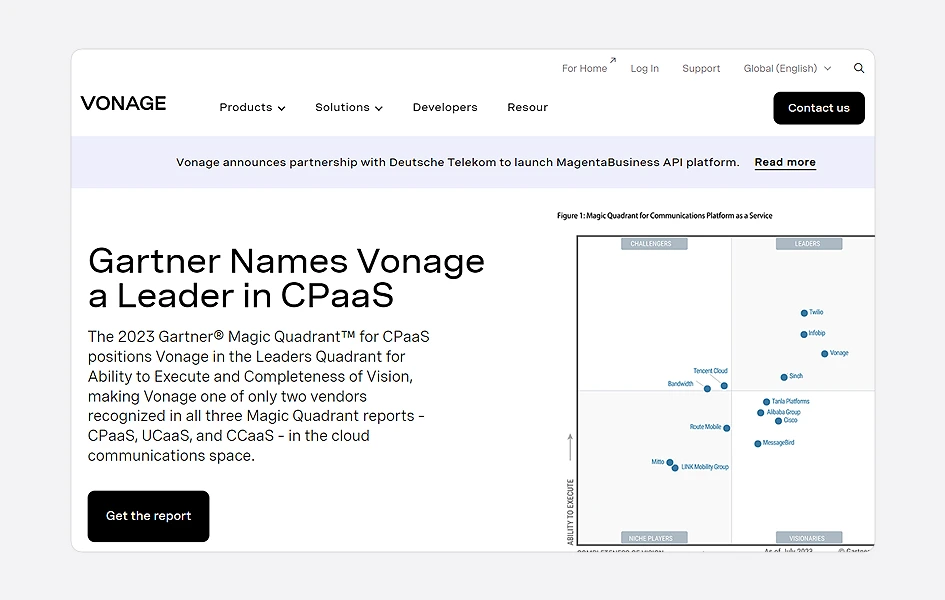
As a leading player in the VoIP arena, Vonage offers features such as communication APIs, cloud call centers, and other solutions tailored to meet the needs of diverse users.
Features:
- Conference calling
- Virtual receptionist
- Single sign-on
- Voicemail transcription
- Business inbox
Pros:
- Has mobile apps for both Android and IOS devices.
- Offers nearly 100% uptime.
- Over 60 countries are covered by unlimited calling.
Cons:
- Occasional billing and customer service issues.
- Dropped calls and poor call quality have been reported.
- Has App-related issues.
Cost:
- Mobile: $13.99 per month per line
- Premium: $20.99 per month per line
- Advanced: $27.99 per month per line
4. Nextiva
Nextiva is a trusted provider of cloud-based communications solutions for businesses of all sizes. They offer a wide range of products and services, such as VoIP phones, video conferencing software, text messaging software, and others that can help businesses connect, collaborate, and grow.
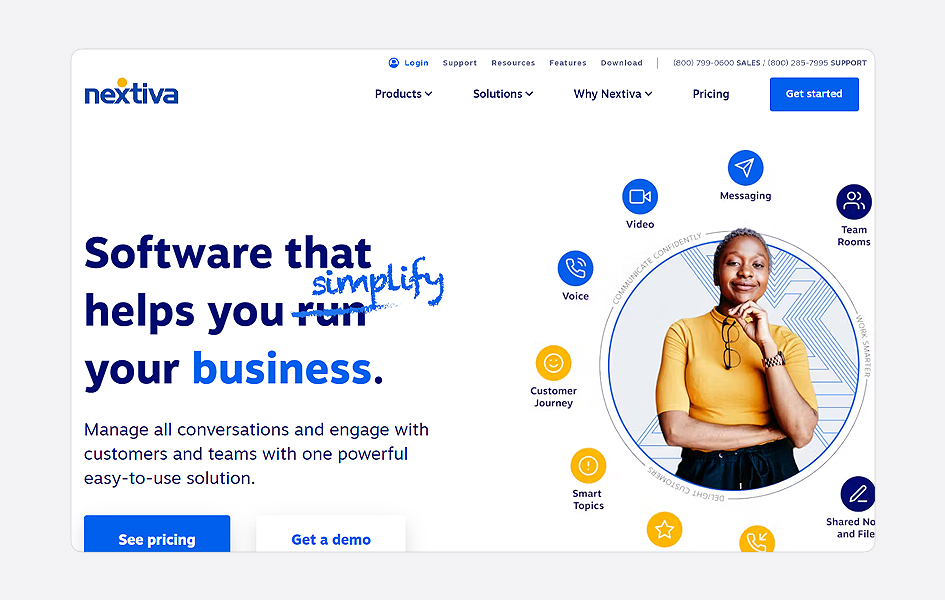
For businesses looking for an easy-to-use and powerful communications platform, Nextiva is a great choice because of its commitment to reliability, affordability, and innovation. Furthermore, its platform is scalable, its services are easy to use and affordable, and it offers plans to fit businesses of all sizes.
Features:
- Screen sharing
- Auto Attendant (Multi-Level).
- Custom Integrations.
- Voicemail Transcriptions.
- Unlimited voice & video calling.
Pros:
- Canada and U.S. unlimited calling.
- Centralized communications management.
- Reliable support.
Cons:
- Issues with mobile apps.
- Inconvenient subscription contract.
- Not best for small businesses.
Cost:
- Essential: $25.95 per user per month.
- Professional: $30.95 per user per month.
- Enterprise: $ 40.95 per user per month.
5. RingCentral
Another notable provider on this list is RingCentral, widely considered a popular choice for businesses of all sizes, from small to large enterprises, and is used by over 400,000 businesses in over 100 countries. Recently, it was recognized as a leader in Gartner’s Magic Quadrant for Unified Communications as a Service (UCaaS).
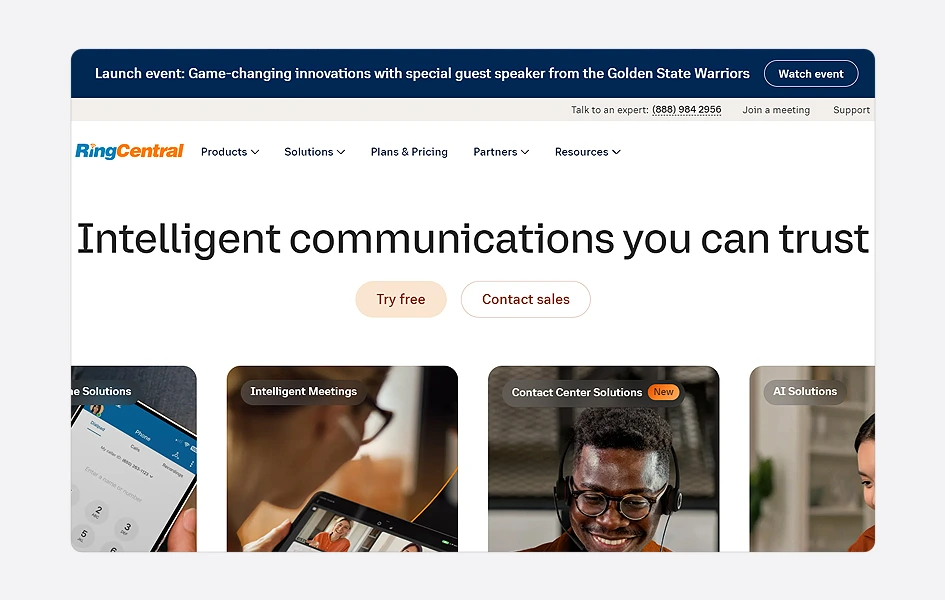
It is a cloud-based communications and collaboration platform that equips businesses with a unified solution for VoIP phones, video meetings, messaging, and collaboration. In addition to that, its platform is designed to help businesses improve productivity, communication, and customer service.
Features:
- Analytics for IT professionals.
- Google Microsoft and access to other APIs.
- Unlimited enterprise-grade HD video, whiteboards, and messaging.
- Essential business analytics.
- Advanced call monitoring and handling.
Pros:
- Has unified communications.
- Has multiple integration offerings.
- Supports multiple lines on a phone.
Cons:
- Difficult to reach its customer service.
- Complex IVR setup.
- In the lowest plan, video conferencing is not included.
Cost:
- Core: $30 per user per month
- Advanced: $35 per user per month
- Ultra: $45 per user per month
6. Ooma
If you are looking for a one-for-all solution, then Ooma is the go-to option. It is useful for both residential and business customers who are looking for a reliable and affordable alternative to traditional landline phone service.
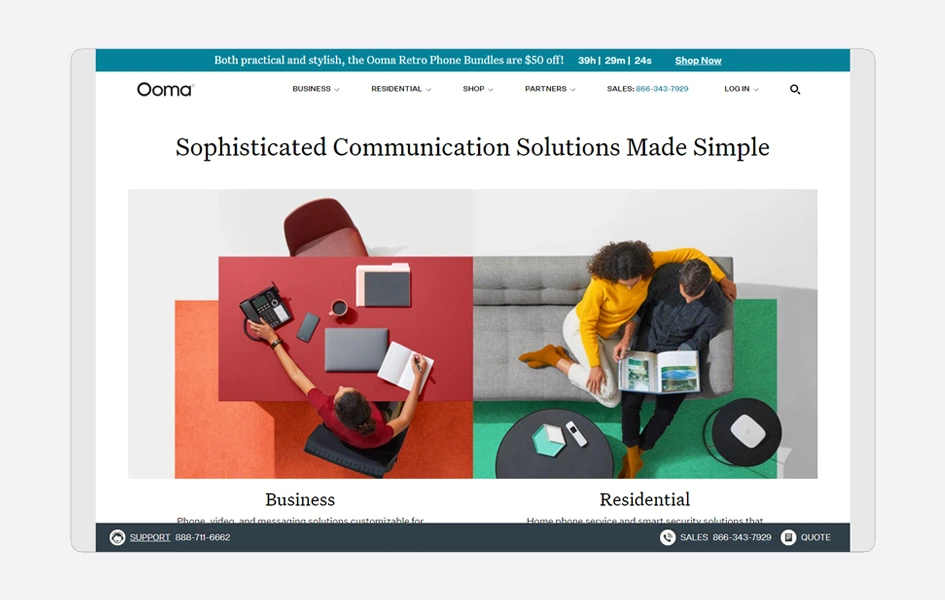
With its easy-to-use products, the company offers solutions related to a variety of communications services, including Voice over IP (VoIP) calling, messaging, and video conferencing, making them a good choice for a wide range of customers. It is a reliable, affordable, and easy-to-use VoIP provider whose products are easy to set up and use without technical expertise.
Features:
- Virtual receptionist.
- Virtual Fax.
- Extension calling and monitoring.
- Paging groups.
- Flexible Numbering.
Pros:
- User-friendly UI.
- Variety of features.
- Forward Calls During Device Outages.
Cons:
- Limited international calls.
- Occasional call quality issues.
- Requires a strong broadband connection.
Cost:
- Essential: $19.95 per user/month
- Pro: $24.95 per user/month
- Pro Plus: $29.95 per user/month
7. Intermedia
To follow, we have Intermedia. It offers Unified Communications as a Service (UCaaS) and business cloud services that are easy to use and secure. In 2023, it has won multiple awards from multiple institutions, depicting it as one of the best business VoIP phone system providers and a great workplace.
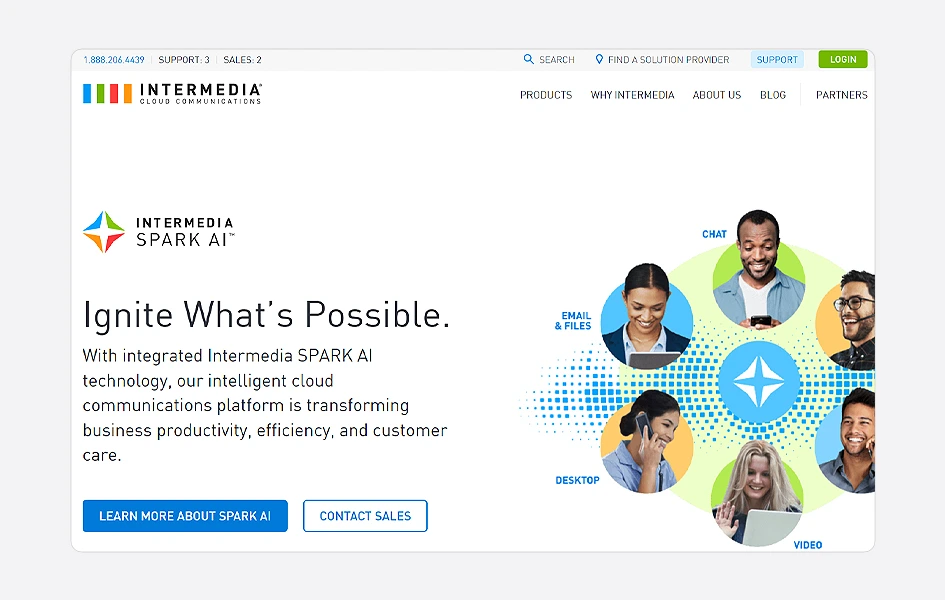
Its VoIP offering, Intermedia Unite, is a versatile and powerful platform backed by a reliable and scalable cloud infrastructure that allows even the most demanding companies to communicate and collaborate easily, thanks to its many features.
Features:
- Apps for desktops, mobile devices, and the web.
- “Click-to-call” extension for Chrome.
- QoS Dashboard.
- Inbound/Outbound Caller ID.
- Screen Sharing (Unite Pro & Enterprise).
Pros:
- Easy to deploy – no hardware required.
- No setup fee.
- Provides all-in-one communication and collaboration capabilities.
Cons:
- Limited call monitoring features.
- Has no Free/Freemium Version.
- Fewer integrations than competitors.
Cost:
- Unite For Teams: $15.99 per user per month
- Unite With Teams: $22.99 per user per month
- Unite Pro: $27.99 per user per month
- Unite Enterprise: $32.99 per user per month
8. Aircall
Next up is Aircall. This VoIP provider offers a comprehensive service that enables businesses to use IP technology for their communications while allowing them to customize and configure it to meet their unique needs.
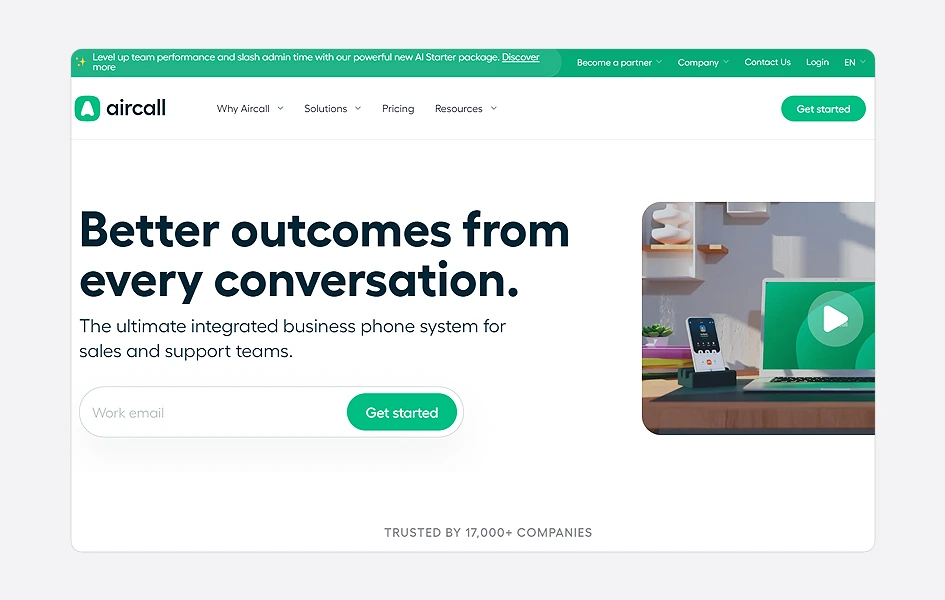
It is used and trusted by more than 17000 companies across the world in several industries, including Burton, Pipedrive, UNTUCKit, and Lokalise. With its Voice over IP solutions, Aircall provides a wide range of features and benefits. It is a popular choice for businesses of all sizes, from startups to large enterprises looking to enhance their operational efficiency.
Features:
- Custom CRM integrations.
- AI-powered transcription.
- 100-plus app integrations.
- Virtual call centers.
- Shared call inbox.
Pros:
- Boasts a consistent 99.99% uptime.
- Can be set up in seconds.
- International calling is available.
Cons:
- Customer Service is poor.
- Dashboard can be clunky.
- Sign-up requires three users at a minimum.
Cost:
- Essentials: $30 per license
- Professional: $50 per license
- Custom: Created by you
9. Phone.com
If you are looking for a reliable, affordable, and feature-rich VoIP provider for your business, then Phone.com is a great option. They offer a wide range of plans and features that make it easy for businesses of all sizes to switch from traditional phone service to VoIP.

It is a modern platform built to meet the needs of today’s agile, mobile, and always-on entrepreneurs and growing businesses; this is the perfect work-from-anywhere solution. Aside from offering all the modern features of an enterprise phone system, it is also affordable and easy to use.
Features:
- Video conferencing
- IP Desk Phone Compatible
- CRM Integration
- Call Analytics
- Direct live streaming on YouTube (Pro Users)
Pros:
- Affordable and easy to use.
- Easy separation of incoming calls.
- 24/7 customer service.
Cons:
- Has a steep learning curve.
- Sometimes, the phone app does not work.
- Can’t match some competitors’ built-in collaboration features.
Cost:
- Basic users: $14.99 per user per month
- Plus users: $21.99 per user per month
- Pro users: $31.99 per user per month
10. GoTo
GoTo stands out as a comprehensive VoIP service provider, offering a unified communications platform under GoTo Connect. Known for its innovative features, user-friendly interface, and comprehensive communication capabilities, it is an industry leader.
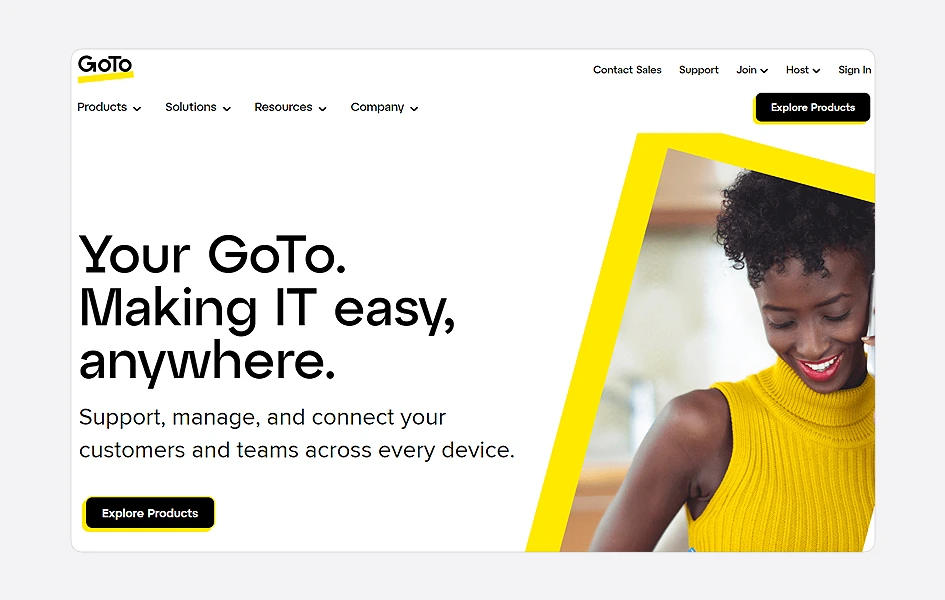
Furthermore, with cloud-based phone systems, video conferencing, messaging, and file sharing, it provides services to businesses of all sizes. More than 50 countries, including the US and Canada, are supported by GoTo Connect’s unlimited calling plan.
Features:
- Encrypted Video and audio conferencing.
- SMS for external messages.
- Passcode-protected meetings.
- Team channels.
- Mobile apps.
Pros:
- Easy-to-use, user-friendly platform.
- Up to 250 participants can participate in video conferencing.
- Up to 2GB of storage is available for file sharing.
Cons:
- It is not as customizable as some other VoIP providers.
- There are some limitations to its international calling plans.
- Some users have criticized GoTo Connect’s customer service.
Cost:
- Professional: $12 per host per month.
- Business: $19 per host per month.
- Enterprise: Customized.
11. Avaya
With Avaya’s cloud telephony solutions, businesses can make data-driven decisions to enhance efficiency and customer satisfaction by utilizing robust analytics and reporting features.

As a leader in the communication solutions industry for many years, Avaya has partnered with global organizations such as Atento, John Hopkins, and G-star and is now known as a company that has been transformed. It is a reliable VoIP software service provider that offers a comprehensive suite of features that cater to every aspect of business operations and is trusted by users worldwide.
Features:
- Meetings and collaboration space.
- Compliance recording + 90-day storage.
- Cloud webphone.
- Ring and hunt groups.
- Advanced and standard call reporting.
Pros:
- Affordable plans with a lot of features.
- Plans are suited for small and large businesses.
- Has a 90-day free trial.
Cons:
- Add-ons can be costly.
- Limited Integrations.
- No voicemail capabilities.
Cost:
- Get a custom quote
12. Mitel
Mitel is a global leader in business communications, providing a wide range of VoIP, enterprise, and next-gen collaboration applications that power more than two billion business connections. Having served over 35 million customers in nearly 100 countries, Mitel is a company dedicated to taking customer communications from where they are today to where they need to be.
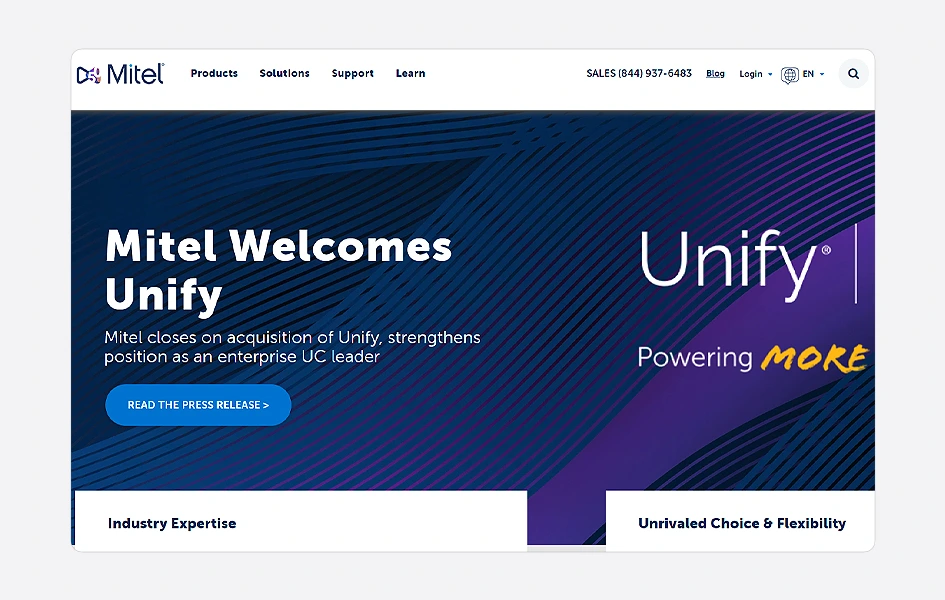
Known for its trustworthiness, innovative solutions, and support services, it offers a range of products with in-demand features, such as contact centers and unified communications that are tailored to meet the needs of businesses.
Features:
- Instant messaging.
- Video collaboration.
- Offers basic integrations.
- Voicemail transcription.
- Multiple collaborative tools.
Pros:
- Customizable solutions.
- Highly scalable.
- App available for both Android and iOS devices.
Cons:
- Secretive security processes.
- Limited integrations.
- Pricing is not readily available.
Cost:
- Essential: $25.49 per user per month
- Premier: $32.209 per user per month
- Elite: $46.76 per user per month
13. Dialpad
Dialpad delivers cloud-based UCaaS services with a focus on cost-effective, scalable solutions. With an award-winning dual-cloud architecture, their global voice network ensures HD call quality for remote and international teams. Dialpad facilitates seamless communication through multiple channels by offering a unified communications platform powered by AI.
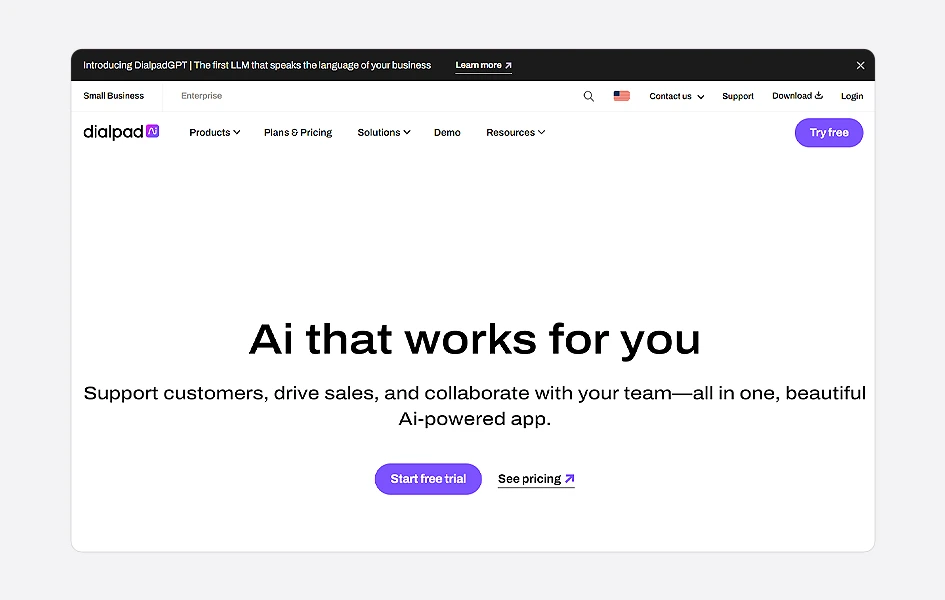
As a scalable, device-compatible, and contact center solutions voice-over-IP provider, Dialpad caters to industries across the board. Known for easy setup and exceptional call quality, Dialpad stands out as a reliable choice for businesses seeking efficient, feature-rich VoIP services.
Features:
- Ai-powered call.
- Voicemail transcriptions.
- Open APIs & Webhooks.
- Dial-by-extension.
- CRM integrations.
Pros:
- Softphone forward model.
- Mobile and Computer Accessibility.
- Offers hardware support.
Cons:
- Gives limited features in the lower plans.
- The app has issues with older Android phones.
- Some users have mentioned reliability concerns.
Cost:
- Standard: $23 per user per month.
- Pro: $35 per user per month.
- Enterprise: Custom-made.
How to choose the best VoIP service provider for residential and business use?
Now that you are familiar with the top providers. It’s time for you to choose the best option for yourself. To be fair, choosing the one that has everything you need, even under variable conditions, is not an easy task. And to help you with that, here is a set of criteria that you can go through to make your decision.
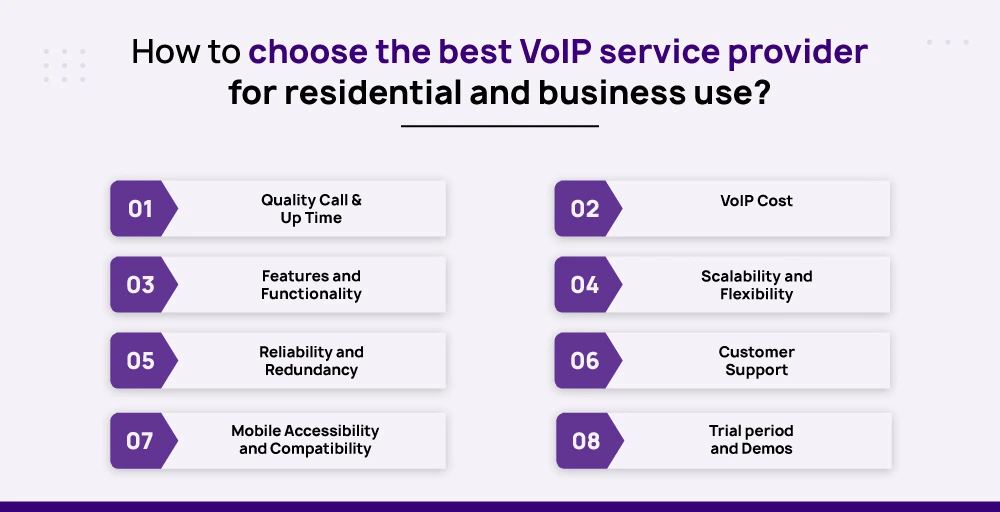
- Quality Call & Up Time: When choosing a provider, your topmost priority should be getting high-quality calls with minimal downtime. To get an idea of this, you can read honest customer reviews and follow community forum discussions.
- VoIP Cost: The next move is to look into the subscription plans put forth by all the available providers and compare each. Dig deep into their website to find out if there are additional charges for additional features or extra setup.
- Features and Functionality: Following that, another step is to look into the features and functionalities offered by the providers. To do this, you should first list out your specific requirements, and taking that into consideration, you can begin your search.
- Scalability and Flexibility: Another thing to keep in mind is the scalable and flexible options provided by the providers, especially if you are looking for one for your business. This is crucial as your communication needs may grow over time.
- Reliability and Redundancy: Yet another factor to keep an eye on is the reliability of the data centers and redundancy measures to prevent provider disruptions. This is, again, very important, especially for businesses looking for cloud telephony services.
- Customer Support: You should also examine other elements, like the quality of customer support provided by the VoIP service provider. This is a definitive step, as an unsupportive communication solution can prove to be disastrous.
- Mobile Accessibility and Compatibility: Additionally, check into the fact that whether the service is compatible with various business systems and is mobile accessible. This is important for seamless integrations and remote businesses.
- Trial period and Demos: Lastly, if available, you should opt for providers that offer a trial period or a demo of their services. It allows you to test the system and ensure it meets your requirements before committing to a long-term contract.
Wrapping up!
To sum things up, the abundance of VoIP service providers in 2024 will surely offer users unparalleled options for communication. But that diversity can be overwhelming, and understanding your specific needs is the key to making the right choice, whether for business or residential use.
And after a thorough exploration of the top providers, KrispCall emerges as the recommended option, offering the best combination of affordability and features. It stands out not only for its exceptional performance but also for its affordability. As the need for communication solutions continues to grow, KrispCall emerges as a cost-saving choice that doesn’t compromise on quality.
If you’re looking for a VoIP service provider in 2024, KrispCall is the decision as it offers VoIP solutions with world-class experience at an affordable cost with many unique features.
FAQs
Is VoIP service suitable for small businesses?
Yes, a VoIP service is definitely suitable for small businesses. Small businesses that use a VoIP service have access to various advantages like improved cost-effectiveness, enhanced flexibility, mobility & scalability, and features that are well suited for their needs in a budget-friendly subscription plan.
What is the difference between Residential and Business VoIP?
Residential and business VoIPs are both voice-over-internet protocol (VoIP) services, which are fundamentally the same but have some key differences. And here are those-
| Type | Residential VoIP | Business VoIP |
|---|---|---|
| Cost | Less expensive | More expensive |
| Features | Basic features such as calling, voicemail, and caller ID. | Wide range of features, including auto attendant, call forwarding, call routing, conference calls, hold music, toll-free numbers, and virtual extensions. |
| Support | Limited support | Better support |
| Target users | Home users | Businesses of all sizes |
| Examples of use cases | A small retail business can use a residential VoIP system to create a professional image for its customers. | A corporation’s sales team can use a business VoIP system to stay connected with customers and prospects on the go. |
Are Cloud-based VoIP services secure?
Yes, Cloud-based VoIP services are generally considered very secure and have stringent security protocols like encryption, data security center, network security, access control, and compliance to make sure that businesses’ data is kept safe and private. However, like all other services, it also has some security risks like data/call interception, account tampering, and data breaches associated with it.
Which is better for me: VoIP or Wi-Fi calling?
Both VoIP and Wi-Fi calling are popular services that are used by millions, and each has its own benefits and works over the Internet. Whether you want to use VoIP or Wi-Fi calling depends on your specific needs and requirements. However, here are some examples of their usage that can help you decide which one is the better fit for you-
VoIP:
- Allows you to make a lot of international calls.
- Provides you with innovative features such as call forwarding and conference calling.
- Is useful if you are on a tight budget.
Wi-Fi calling:
- Used for making and receiving calls in areas with poor cellular coverage.
- The Wi-Fi calling feature is often included in your mobile plan.
- In case you are concerned about security and want to encrypt your calls.

